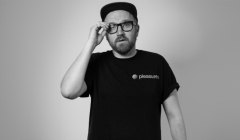
Creativity in 2025: Smaller, sharper, and a little less purposeful
Scott Dimbleby strives for a year of embracing fun and humour to offer audiences escapism.

Why branded podcasts more often than not miss the mark

It’s rarely a success when companies get into podcasting simply because they feel they should follow the trend, or because of internal vanity reasons, or because there’s a one-off chunk of budget left over at the end of the year. In such a crowded, corpulent market, you need purpose, passion, and a point-of-view to stand out.
Know why your podcast deserves to exist, and what difference it aims to make. Be ambitious and differentiate yourself. BMW achieves this with Play Next, a new music discovery show that licenses tracks to be played in full, a notoriously tricky thing to do in podcasting.
Rather than being corporate mouthpieces, the best branded podcasts feel like extensions of the most playful side of a brand’s personality
Jack Howson, Head of Audio at Peanut & Crumb
As opposed to ‘broadcasting’, podcasting can be termed ‘narrowcasting’. That means series usually work best when they find a niche, and make space for depth not breadth. Podcasts cannot be Swiss Army Knives, catering for all. Ask yourself: Who is actually going to listen to this, and what are we able to offer them that nobody else can? How do we make something that feels bespokely tailored to our target audience?
Many of the most popular podcasts are comic, or cinematic, or indulgently conversational and opinionated. These styles all flourish with editorial and creative freedom. They are not nourished by the conditions of constrictive company guidelines. Rather than being corporate mouthpieces, the best branded podcasts feel like extensions of the most playful side of a brand’s personality.
Take We Are Voices from British Red Cross, which features the testimonies of refugees and asylum-seekers. Despite the super serious subject matter, the series is often loose, steadfastly human, and frequently makes me laugh out loud.
Unfettered creativity is important for a DIY indie podcast, but it’s surely even more important for a branded series. Let’s face it, with such a surfeit of choice, listeners aren’t going to opt to engage with an elongated advert, so you have to give them maximum value and prove you’ve got imaginative chops.
Commit in the pocket:
It’s true that almost anyone can make audio on a shoestring. That accessibility is one of the reasons why there’s so many podcasts, and why there’s a glut of great young audio-makers about. However, that’s no reason for companies to do it on the cheap. The quality of your podcast reflects the quality of your brand. Firstly, pay for the production houses who can make exceptional audio for you. If you’ve heard Hackable from McAfee, for example, you’ll understand that interviewing, recording, editing, and mixing are specialised skills, so it’s unlikely that your in-house comms or content team can craft a winning podcast by themselves. And then - once you have your completed series - pay again to market the thing, to give it a chance of cutting through.
Commit to pre-production:
I’ve worked with clients who wanted to bosh out the first episode mere minutes after an initial brainstorm. But the more planning, refining, and piloting you allow, the higher the creative ceiling. And the more episodes you have ready in the can when you launch, the more possibility of press coverage. We’re talking several months of preparation, not weeks.
Commit to championing presenters, artists, or journalists who can benefit from your platform:
Think of the way that Red Bull has supported so much underground music for years. In return they’ve received regular rejuvenating, renewing shots in the arm from the best talent around, and come into contact with the young fans that those musicians bring with them.
Commit to growth over time:
Like a pet, a podcast is for life, not just for Christmas. No matter what your KPIs are for a podcast - and there can be many - this medium is not a short-term tool. It can take a while to build an audience and develop your audio identity. Listeners really do reward regularity, reliability, and longevity.
Jack Howson is a multi-award-winning audio-maker and executive producer of broadcast radio and podcasts. He is Head of Audio for Katie Derham and Jane Gerber’s Peanut & Crumb, overseeing a slate of original and branded content. He has developed and launched acclaimed podcasts for Spotify and several major art institutions, and produced flagship music, poetry, drama, and documentary strands across BBC Radio. He was the winner of Best Music Producer at the Audio Production Awards 2021.
Looks like you need to create a Creativebrief account to perform this action.
Create account Sign inLooks like you need to create a Creativebrief account to perform this action.
Create account Sign in